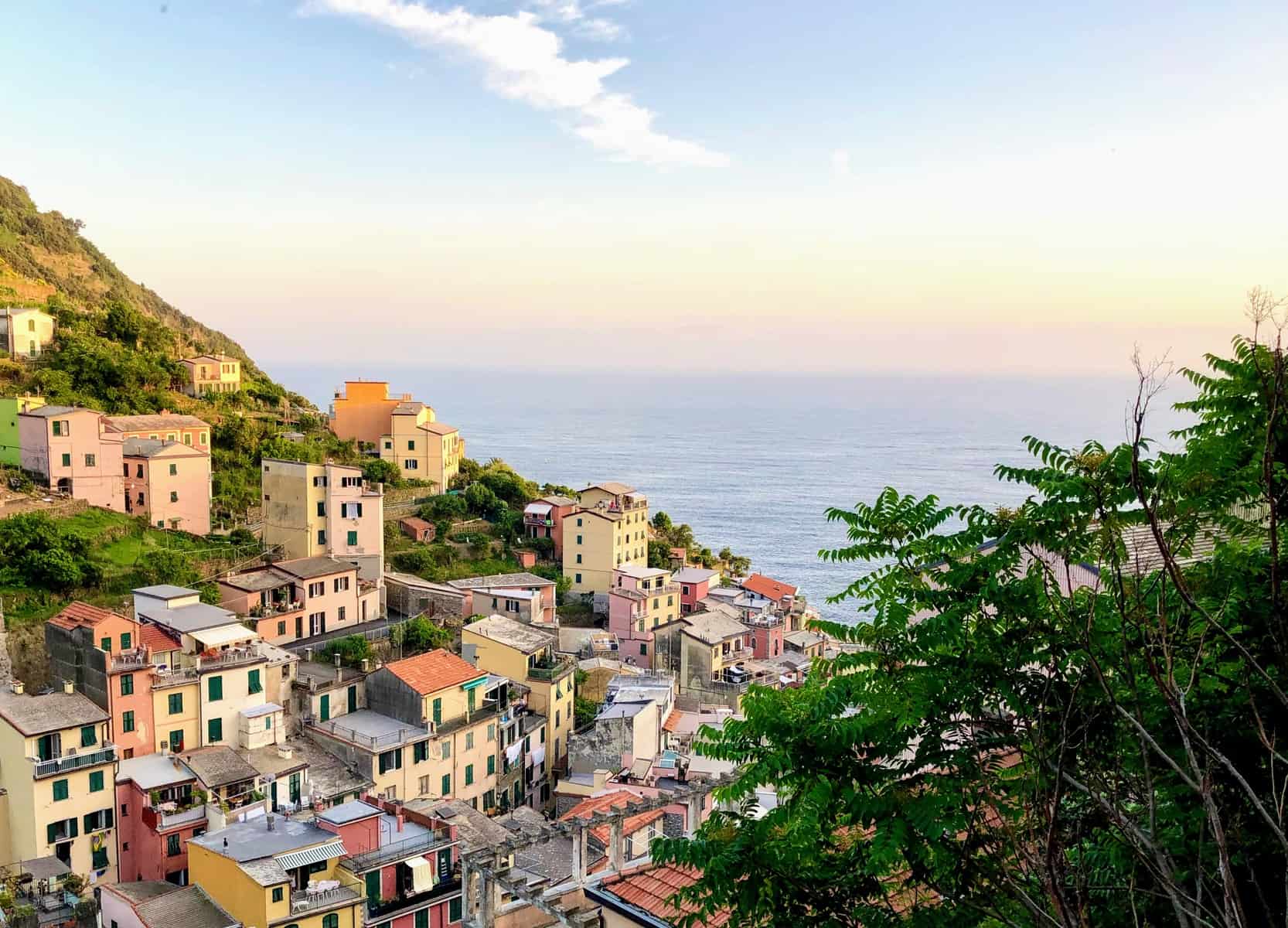Staying in Riomaggiore: a Guide to the Best of Cinque Terre
For the last few decades, one of the more popular destinations in Italy has been the Cinque Terre, five beautiful little villages tucked into the folds of the Ligurian coastal range. Although this has been good for the local economy, it’s taken a toll on the environment. I figured I had missed my chance to see the landscape unspoiled by the masses, so visiting Cinque Terre just after the pandemic lockdowns was an opportunity too good to miss.
What makes these villages magical is their isolation – the rest of the world disappears, leaving you surrounded by paradise: bright turquoise sea, glowing green hills, timeless buildings in cheerful hues, oleander and bougainvillea, rocky harbors and beaches, excellent food, and hiking trails of all lengths and difficulties. You could pick a random spot in any village and find breathtaking 360-degree views; it’s pretty much impossible to take a bad photograph here.
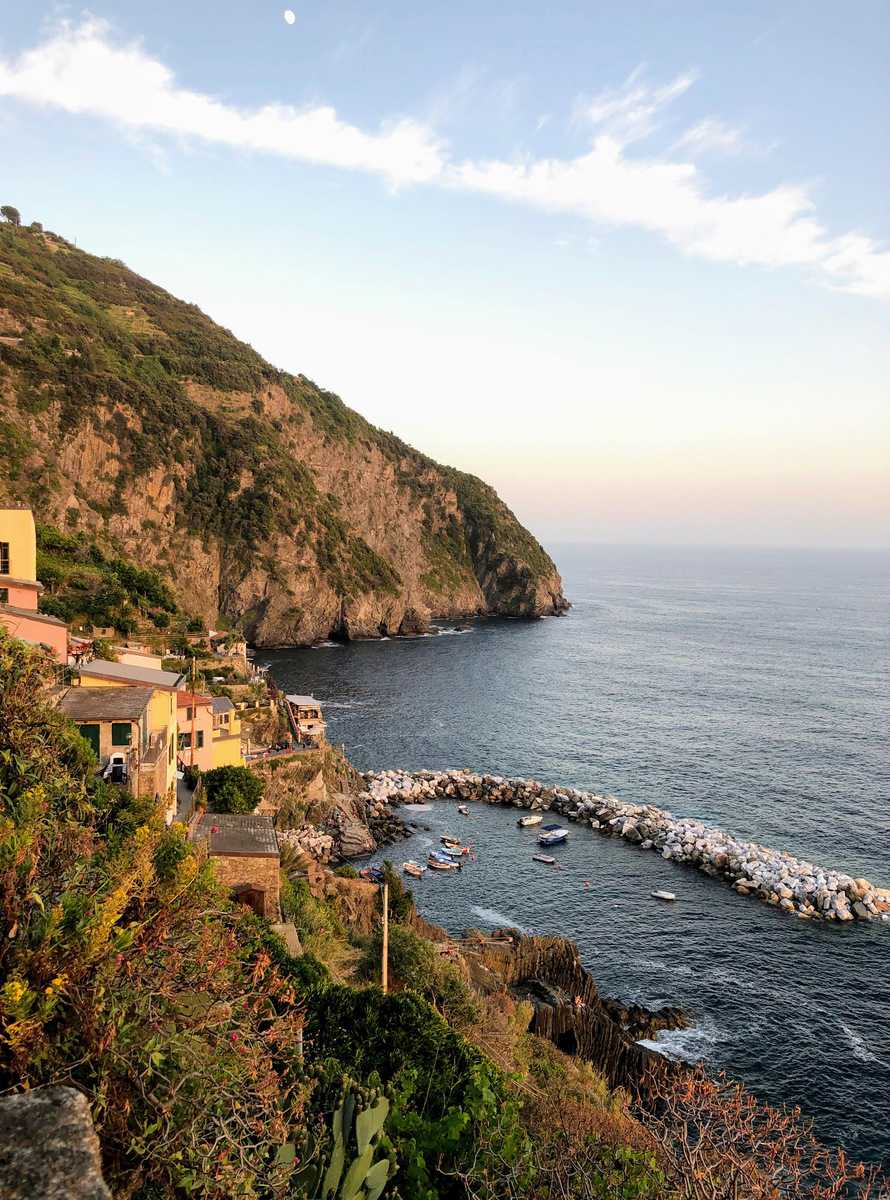
Staying in Cinque Terre itself rather than day-tripping is definitely the best way to experience it. Dawn and dusk are the nicest time of day, and probably the best way to avoid crowds during high season. It’s also a treat to hear the waves crashing as you go to sleep.
The Cinque Terre are comprised of Riomaggiore, Manarola, Corniglia, Vernazza, and Monterosso. Each village has a slightly different flavor.
Riomaggiore
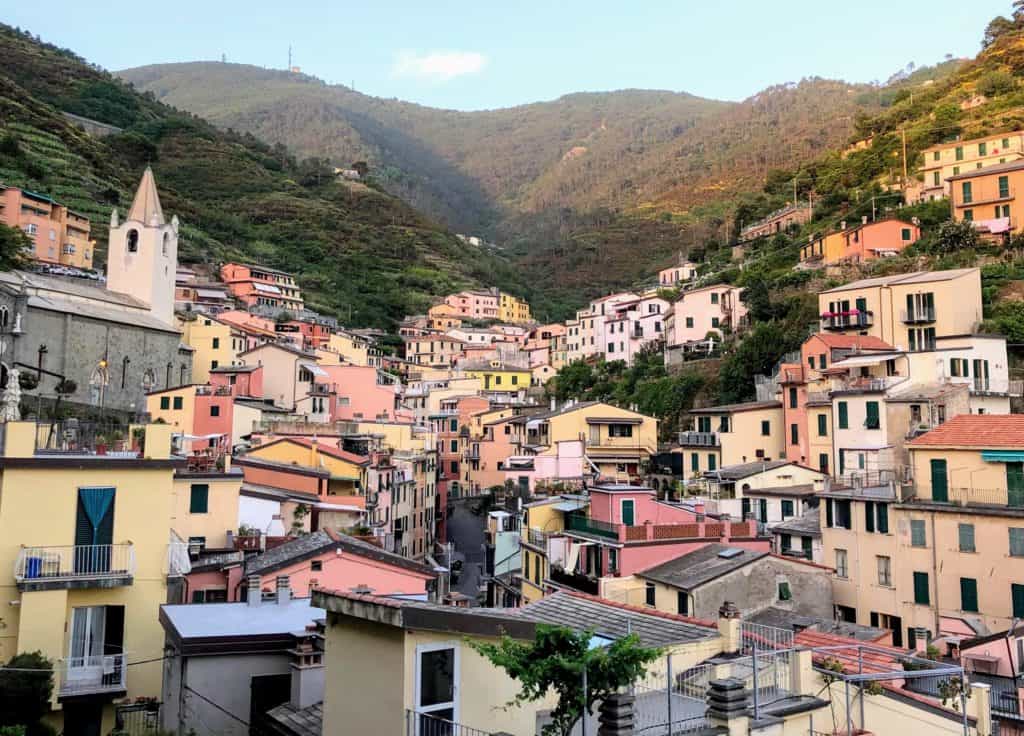
Pastel-hued Riomaggiore is the largest of the villages, with a year-round population of around 800. We were glad to stay there, as it offers more choices for food and accommodation. There are several distinct areas and levels to explore, and it even has two glass elevators connecting them if your feet need a break. The piazza by the train station has a nice tourist office, along with some places to eat. A winding street runs back and then up along a residential area, eventually merging with the iconic Via dell’Amore. Or you can take the long tunnel with its sea-themed mosaic mural to the main part of town. Stairs lead down to the tiny, sunken harbor, around the corner of which is a rocky beach. The Via Columbo goes back into the hills, looping around to connect with the Via dell’Amore.
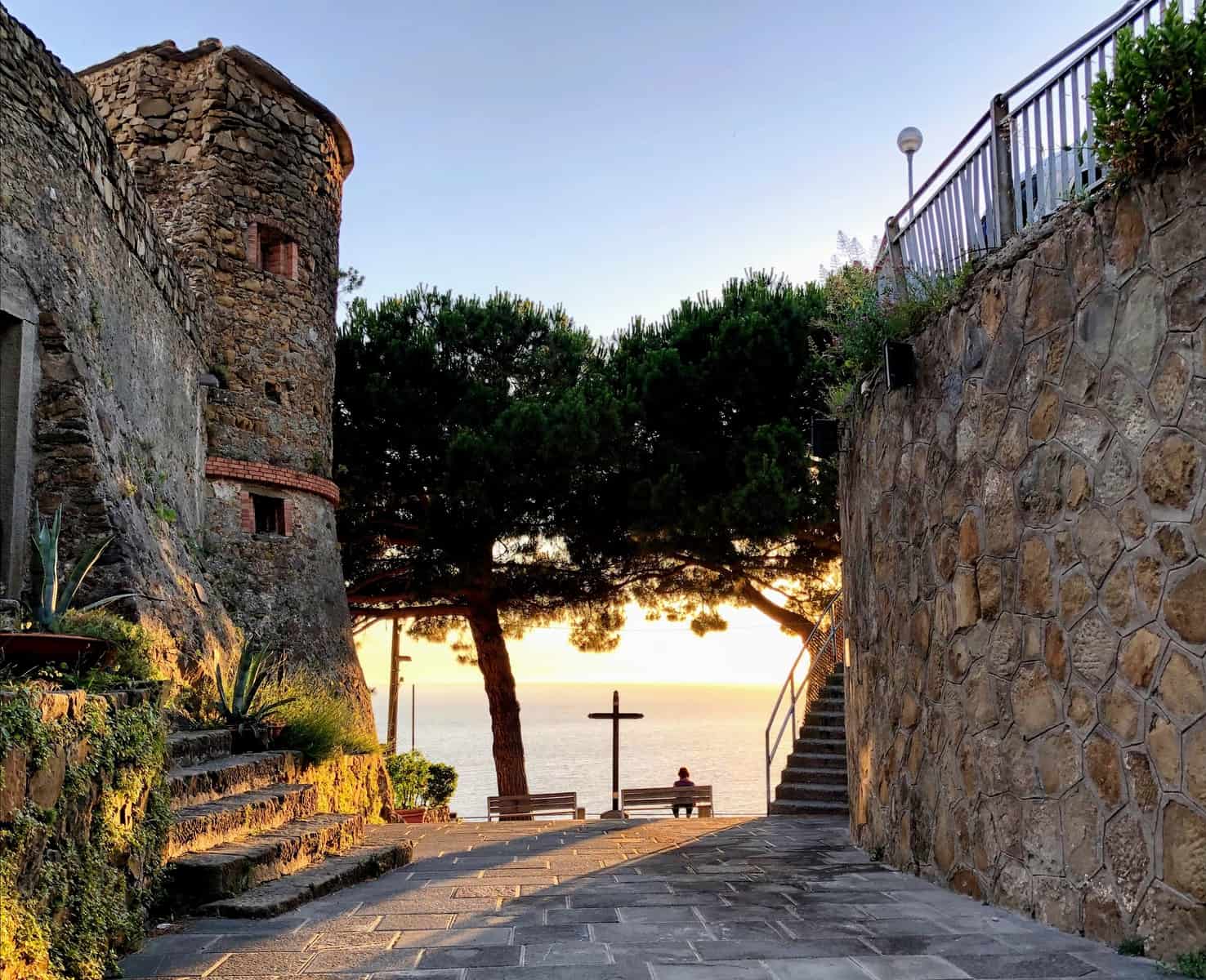
Children like to play in the piazza in front of the church partway up the hill, and at the very top is the tiny Castello di Riomaggiore with (you guessed it) breathtaking views.
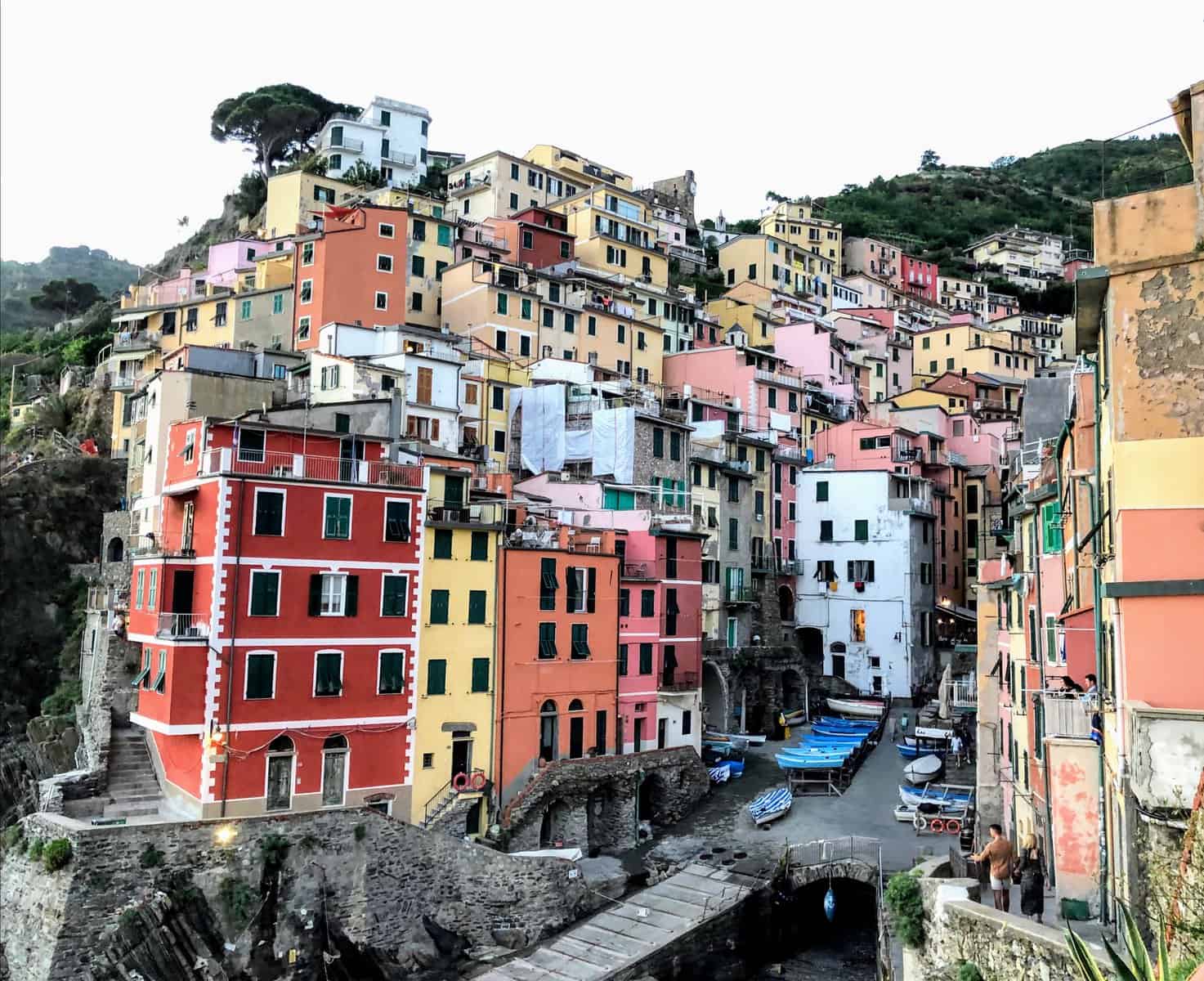
In recent years, many travelers found Cinque Terre too crowded, and some people were questioning the whether the local environment could withstand the impacts of tourism. When we visited, it was busy but not crowded.


We stayed at I Limoni di Thule, a family compound surrounded by lemon trees, and across the street from the Castello di Riomaggiore. The views from our room were incredible. The two-storey guest house has a suite on each level, both with balconies, and the one on bottom has a private terrace.
Christina picked us up from the train station on a moment’s notice (we wound up arriving several hours early), and immediately made us feel welcome. Grazia, who tidied our rooms each day, doesn’t speak English, but gave us big smiles and left fresh lemons in our room. She wanted to know which town we liked best – it seems there’s a friendly rivalry going between the villages.
Christina’s husband said that the hills were all terraced for farming when he grew up. Only a generation later, more than half of them are covered with wild vegetation; locals make better money from tourism.
Manarola

Manarola wraps back into the hills, surrounded by vineyards. The town itself has a beautiful old church, and a dramatic harbor surrounded by massive rocks and cliffs. We followed the hiking trail starting at the back of town and passed through the wineries along the top of the hills. We found terraces full of vines interspersed with wildflowers, pines, and other vegetation, all of which were literally glowing in the sun. Such profusion perched on a precipitous slope, combined with the backdrop of the sea … it was a heady experience. There was almost no one else on the trail, although we did acquire a guide in the form of a sweet cat who accompanied us all along the top stretch. (Cat lovers: stray cats are looked after or adopted by residents. I can’t imagine a better place to live as a cat.)


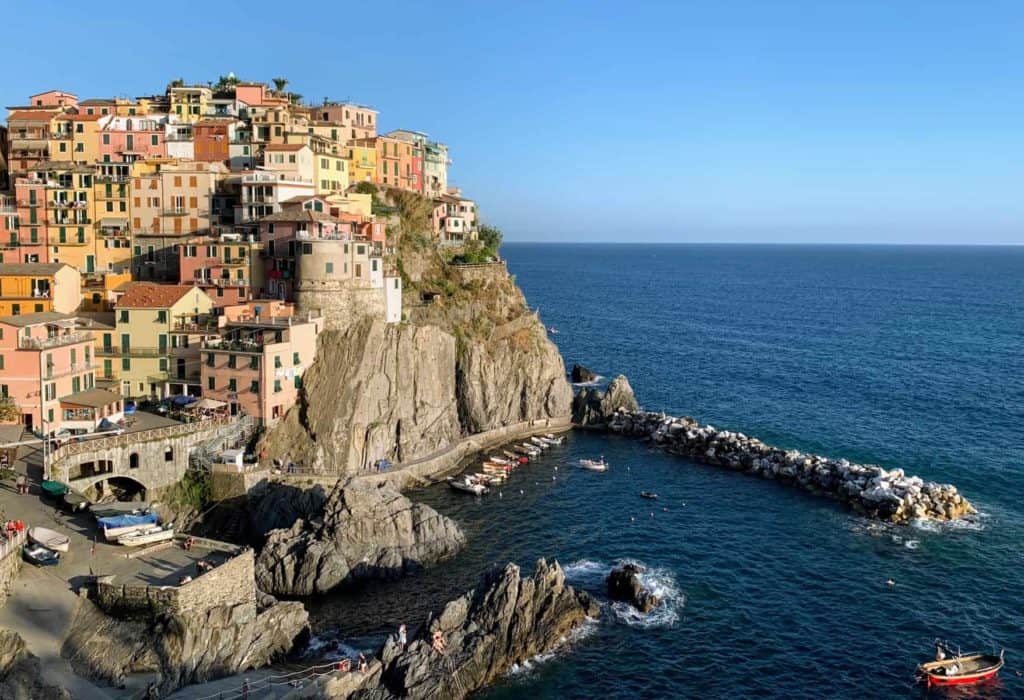
Eventually the trail took us right over the harbor, which is perhaps the most famous view of the region.
Vernazza
Vernazza is a gem. The most colorful of the villages, it packs an unbelievable amount of charm into a tiny package. The train drops you off at the back of town, and the main street (Strada Provinciale 61/Via Roma) winds down from there. It’s lined with shops selling olive oil, soaps, and tea towels; there is also a morning market with local produce. We picked up some fresh focaccia on our way to the harbor, which is the heart of the town. The petite Piazza Marconi is a burst of bright umbrellas in rainbow hues, next to a cute little sandy beach.Every direction offers its own temptation. Cafes on the piazza serve coffee, drinks, or a meal and are a popular gathering spot. You can also picnic just about anywhere or pick up a superb gelato made with local ingredients at Gelateria Il Porticciolo (we recommend the lemon).

The vivid aquamarine water is warm, and the breakwater makes this a lovely spot to swim, either from the sandy area or the big rocks lining the cliff along the water’s edge.
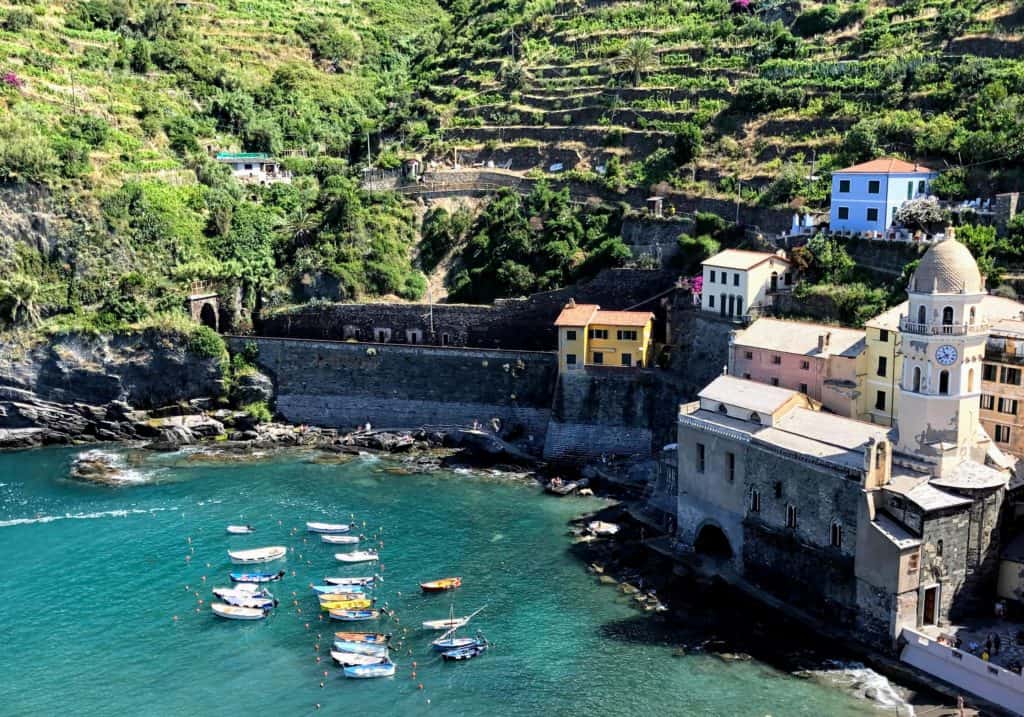
Eventually we clambered up the main hill via miniature passageways and stairs offering something new to see around every corner. On a hot day, it was a blessing to find shelter in the cool stone alleys. Castello Doria crowns the top, with wraparound views. On the other side of the harbor, a trail runs over the beach, with the option to hike all the way to Monteroso or simply take in to picture-postcard vistas of the main town against the sea.


Corniglia & Monterosso al Mare
Sadly, we didn’t have time to visit all five villages. The ones we missed:
Corniglia is the smallest of the five and lacks direct coastal access. Because of this, it is the least crowded, and more oriented to the hiking set.
Monterosso al Mare is the only village with a sizable beach, and it’s reputed to feel a little more like a traditional Riviera resort.
Porto Venere
We also visited Porto Venere, informally known as the sixth village of the Cinque Terre.
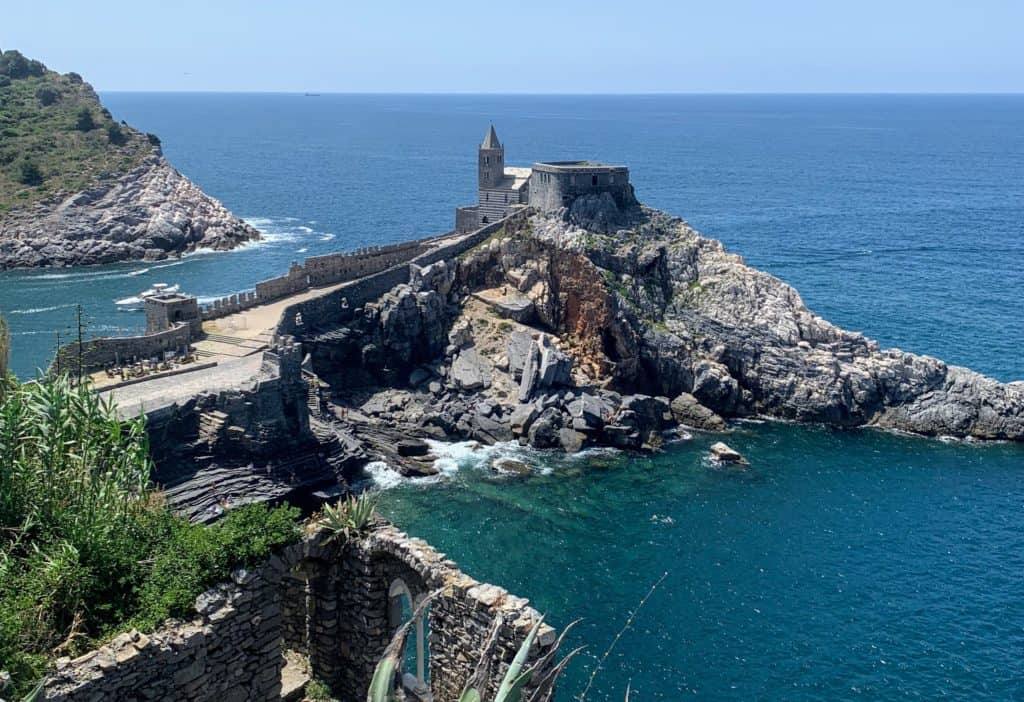
This tiny town is a cousin to the ones in Cinque Terre, with some of the same features in a different layout. Instead of trickling back into the hills, it has two more or less straight streets running parallel to the harbor. Because it lies on a promontory at the edge of the Gulf of Poets, it doesn’t have quite the sense of isolation you get in Cinque Terre – which is ironic since Porto Venere doesn’t have a train station and is therefore slightly less accessible. The view is dominated by the large island of Palmaria, across a narrow strip of water. Like Cinque Terre, the village buildings are old and colorful with a mixture of restaurants, cafes, and shops.
Porto Venere is also notable for the Church of St. Peter at the tip of the promontory, right next to the cove where the Romantic poet Lord Byron used to swim. The Gulf of Poets is named for Byron and Percy Shelly, who lived across the bay in San Terenzo.
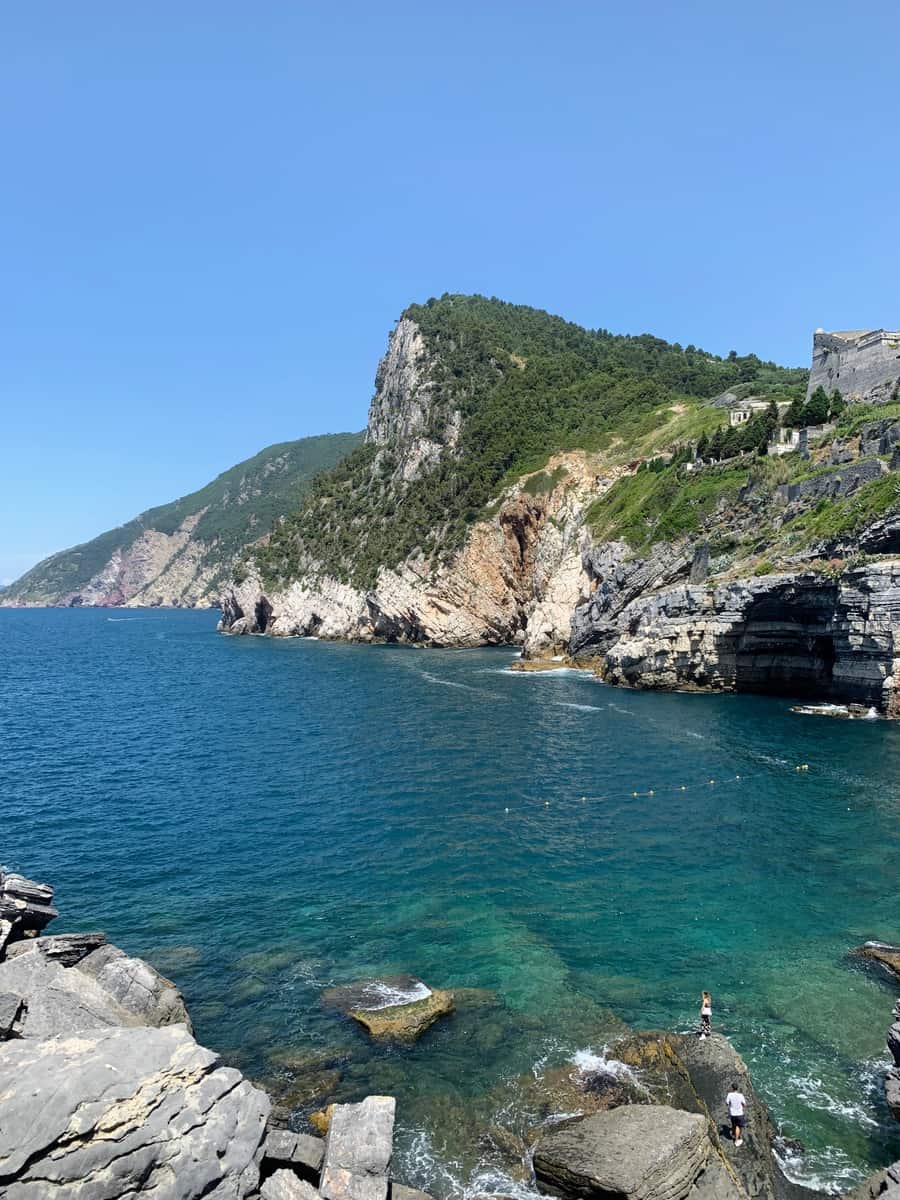
Next to the promontory and behind the town, the fortress Castello Doria spills down the hill, with views of the island and the bay amongst massive pines. The San Lorenzo church, with a lovely courtyard, is just below.
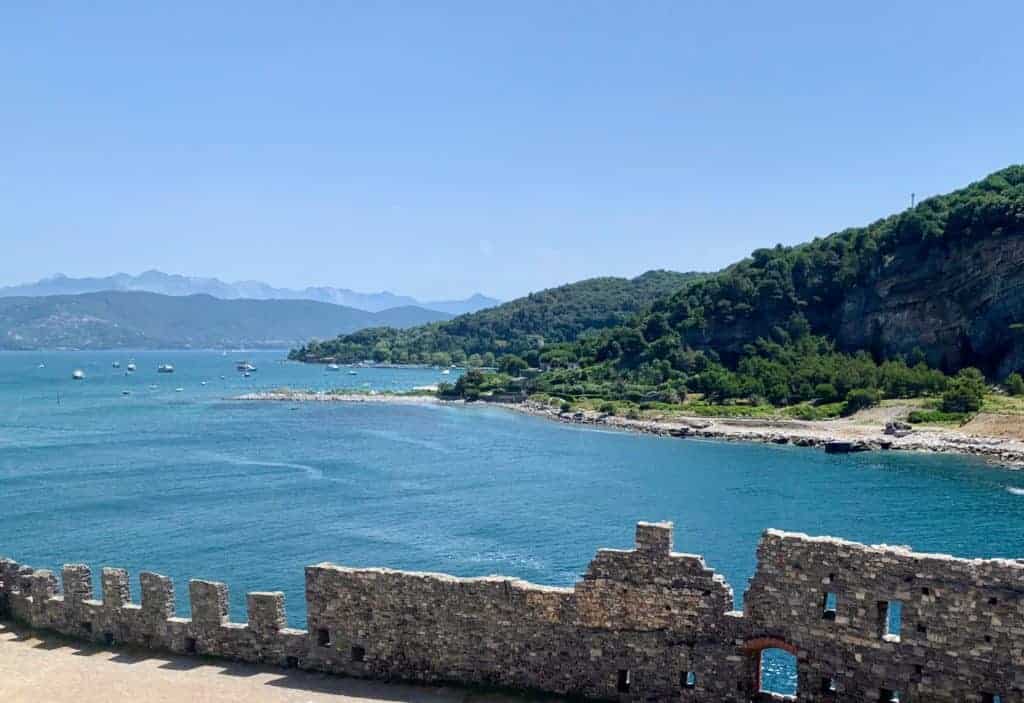
Ferries run to the island of Palmaria with its rocky beach.
Since there is no train station, the two main options for getting to Porto Venere are via ferry (from Cinque Terre or the hub town of La Spezia) or a beautiful bus ride from La Spezia.
Getting there and around
It’s best to avoid driving to Cinque Terre. Frequent trains are the easiest way to access each village, and the stations all have amazing views of the water. When our train first popped out of the mountain right over the water, we both gasped. The ferry, which stops in each village before continuing on to Porto Venere, is worth taking at least once for the views from the water. It’s also possible to hike between the villages, although mudslides have forced some trails to close.
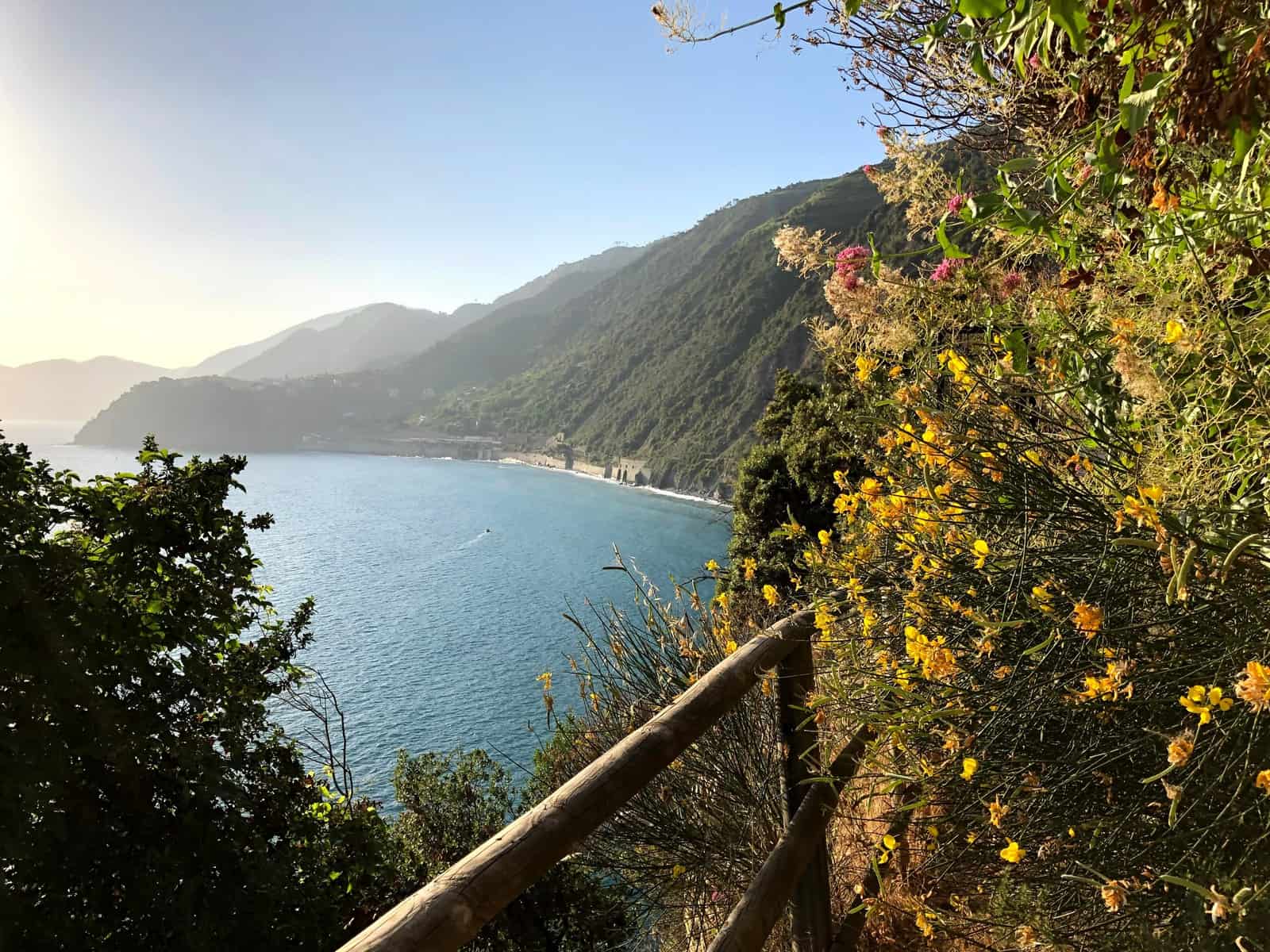
Tips for visiting Cinque Terre
Local blog Cinque Terre Insider has great tips.
Check which trails might be closed, as landslides are an issue. Also, there are some simple regulations, such as wearing hiking shoes for the more advanced routes; it’s also best to avoid using metal hiking poles on the delicate terrain.
Be aware that ferry schedules frequently change, due to the difficulty maneuvering in the tiny, rocky harbors and the choppy surf.
Sustainability: learn about the region’s dry stone walls and how to save them.
For more destinations in the area, see our posts on Camogli and the Portofino Peninsula and Genoa.

